- Sure, it's very satisfying to finish something. Take a couple of days and be happy, or happyish.
- But—then you have to get to work to get your project published.
- And then you start on a new project.
- Writing is a way for me to understand the complicated world I have been born into….
- Sometimes! But it's changed over the years.
- I usually listen to the Clash before starting work....
- Well, it's capitalism.
- Percival Everett once told me that "the writer's true self will always elbow its way onto the page."
- For most of us, our fears are very deep and usually unspoken.
- We are all complicated!
- You can just skip a space, and then the narrator can begin the next section, "Months later...."
- The best thing about teaching CW is working with energetic young people....
- Stories can come from everywhere, and do.
- Once a piece gets published, it's pretty much done. But until it's published, feel free to go back and back again, if you want, until you are truly satisfied....
- Many writers have a tendency to overwrite the ending. Just cutting off the last couple of paragraphs or so, or even the last words, can be an easy fix to make the story better.
- There are no definitive endings in nature. Abrupt is often better...?
- In a short story, you don't want to have very many characters. There’s not enough room for them!
- I know my first drafts are flawed. I know that every text is flawed. So—of course, I've written a flawed text.
- Then I revise—and I fix the flaws.
- My advice—accept the flaws and move on and finish. Then fix the flaws.
- Of course, I grew up in the 1970s, and these things were little understood....
- The more you write, the better you get. It really is a learning process....
- Paragraphs!
- You probably want to leave with the impression that the life of the protagonist is....going on....but it's going on differently because of what happened in the story....
- Yes. Keep moving forward. Finish the story.
- Then—abandon it, or revise it. But finish it.
- Please don't ever delete your work!!!!!!!! You might want those words later. THEY ARE PRECIOUS.
- Well...it took me 45 years to finish writing my first book. But—from first word to final draft? About three years.
- The idea what to write—well, I have hundreds of ideas. I'll never write them all. But I chose the one that spoke to my heart.
- Make significant changes. Look deep into your story and your poems. Elevate them.
- Just making grammar/spelling/punctuation changes are not enough....
- For me, the crisis we're living through is a spur to get going and keep going. "I will not be defeated," etc.
- Try taking your response—anger, sadness, whatever it is you're feeling—and put it in your writing. Engage with your environment.
- "Anger can be power."
- Pandemic is putting the kibosh to FTF networking.
- Keep writing. Keep learning. Support other writers. Be a Literary Citizen.
- Make everything better.....
- There are many ways of telling stories....
- NO!!!!!!!!!
- Again, I grew up in the 70s. So, yes. And there are stories about that.
- America has always been a tense and violent place.
- You have heroic rescuers! Anguished loved ones! And the tick-tock final breaths of the unfortunate trapped human....
- Yes, a contemporary rebooted version of Ace in the Hole would probably add more moral complexities....
- It would be a heartwarming human struggle which would take our media minds off the grim pandemic/political news.
- People would go crazy for this!
- (Let's pool our money and acquire the rights....?)
- A novel? One....
- Stories? Maybe eight or ten....
- I think he was going for bleakness—the (apparent) emptiness and desolation of the desert….
- But my favorite is--The Big Lebowski!
- Best movie about journalism? His Girl Friday, with Cary Grant and Rosalind Russell. (Streaming on Amazon).
- Every little town had a least one newspaper.
- All kinds of madnesses are out there....
- We get to talk about it next week!
|
All of the answers, none of the questions....
0 Comments
It's the end of a busy semester--well, almost the end, since there's still one last grading frenzy to undertake. But the end is close enough that I can kind of see it-- From the work in progress: Last days are always bittersweet for me. There’s a sadness in the act of saying goodbye to the students—many of whom I get to know a little over the previous three months, and like a little. But the sadness is always balanced somehow against the brain-numbing exhaustion of a long semester and the anticipated delight of a coming rest. Rest? Maybe not. There is too much literarying to do!
Tropes Themes Things Stuff  A pile of stories A pile of stories At the end of Fall Semester 2015 I was reading student creative writing portfolios when I noticed a surge—a spate—of stories about young people getting engaged. The stories were all pretty much the same—girl and guy out for dinner, then they take a walk around the neighborhood, and then the guy suddenly drops to his knees and offers the girl a ring, and the girl cries. The end. There were six of them out of one class. I realized I had noticed similar spates of stories over the years, and so I was inspired to start keeping track of what I was reading. Just a simple list of whatever the writer appears to think is important to their story. And—I love it. All of it—all of the stuff my students write about, good or bad or whatever. Some of what I notice is thematic (boring engagment stories), and some of it is just stuff—things—that gets repeated in multiple stories. I’m aware that it’s a highly subjective list, that a different reader might well notice different things, or classify the things differently. Yet I just find the list fascinating and wonderful. I wish I had been keeping records like this for the past 15 years or so….. Anyway—here is the list, based on approximately 251 stories my students have written this last year…. (Listed as (ranking): (thing) | (number of examples)) 1: real place | 88 2: student | 56 3: love/misc | 52 4: drugs/drinking | 49 5: violence/misc | 44 6: cell phone | 35 7: meet cute | 32 8: job | 31 9: driving | 30 10: eating | 29 11: sex/lust | 28 12: kid focal | 27 13: texting | 27 14: depression | 26 15: weather |25 16: waking up | 24 17: non-pet critters | 24 18: car wreck | 22 19: kids | 22 20: waking up/beginning | 22 21: memory | 18 22: grief | 16 23: pet | 14 24: social media |14 25: breakup | 14 26: death/parent | 12 27: dream | 12 28: music | 12 29: friendship | 11 30: murder | 11 31: death/misc | 11 32: death/self | 10 33: ghost | 10 34: religion | 10 35: war/military 10 36: gltbq | 10 37: light out for territories | 10 38: nature | 10 39: cancer/illness/injury | 9 40: sexual assault | 9 41: sports | 9 42: start with dialogue | 9 43: knocked on head/Pippen | 8 44: death/spouse-fiancé | 8 45: divorce | 8 46: death/child | 7 47: magic realism | 7 48: psycho | 7 49: stalker |7 50: aging | 7 51: games | 6 52: kidnapping | 6 53: mental illness | 6 54: death/friend | 5 55: death/grandparent | 5 56: getting engaged | 5
57: reading | 5 58: tv | 5 59: theft/robbery | 5 60: computer | 4 61: death/sibling | 4 62: death/suicide | 4 63: fantasy | 4 64: vomit | 4 65: farming/ranching | 4 66: amnesia | 3 67: jail | 3 68: infidelity | 3 69: motherhood | 3 70: cadaver | 2 71: jewel thieves | 2 72: politics | 2 73: pregnancy | 2 74: race/ethnicity | 2 75: shopping | 2 76: western | 2 77: travel | 2 78: writing | 2 79: visual art | 1 80: birth | 1 81: coma | 1 82: drowning | 1 83: dystopia | 1 84: fairy tale | 1 85: funeral | 1 86: psychic | 1 87: reincarnation | 1 88: torture | 1 89: trains | 1 90: homelessness |1 91: generations | 1  Very early in the semester students become aware that I usually begin almost every class by saying something like: “So—what’s going on today?” I ask this question with the hope that a student will speak up and tell me something they have done since class last met. Maybe the student will have had an adventure—gotten arrested or fallen in love—or maybe they will have done something as mundane as taking out the trash. If no one volunteers a story I’ll usually ramble on with a story or three of my own. Every semester there is a student or two who are very annoyed by this in-class storytelling. They really do get mad! I can see it in their eye-rolling in-class faces and I can really see it in their end-of-the-semester class evaluations. I find their annoyance both amusing and sad. I find it amusing because these students are apparently unaware that the class will last a mere 50 minutes no matter how many stories get told. I find it sad because these students are apparently unaware that stories are at the very heart of what we do in class. Whether through poetry or prose, this class is devoted to increasing our individual and collective understanding of the world we live in. And stories are one of the most important ways we gain this understanding. Remember this at all times: You have a voice. Your voice is unique. No one knows the stories you know. Time is limited. Time is running out. Someday, sadly, you will be dead and your untold stories will die with you. So: seize every chance you get to tell your story....  On the first day of class, I had the Young Scholars give me written questions—about the class, about writing, about literature. One student asked, “When we were working in small groups, you were looking out the window. What were you looking at?” A good question! Our classroom is on the third floor of Grubbs Hall, at the back of the building, looking out over a parking lot. And I was indeed looking out the window while the students worked.
It’s a big world out there! You can see a lot of things if you look out the right window…. 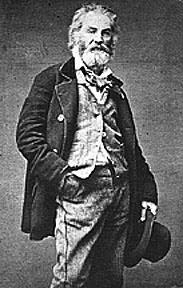 Had a typically wonderful time at the annual Walt Whitman Birthday Bash Thursday in Conroe. The main performer was Bruce Noll, who offers a “dramatic interpretation” of Leaves of Grass. He was very good—a true pleasure to hear the words recited, acted, not just read. For my part art the Gathering of Poets, I read a segment from the Preface to the 1855 edition of Leaves of Grass: The American poets are to enclose old and new, for America is the race of races. Of them a bard is to be commensurate with a people. To him the other continents arrive as contributions . . . he gives them reception for their sake and his own sake. His spirit responds to his country's spirit . . . . he incarnates its geography and natural life and rivers and lakes. Mississippi with annual freshets and changing chutes, Missouri and Columbia and Ohio and Saint Lawrence with the falls and beautiful masculine Hudson, do not embouchure where they spend themselves more than they embouchure into him. The blue breadth over the inland sea of Virginia and Maryland and the sea off Massachusetts and Maine and over Manhattan bay and over Champlain and Erie and over Ontario and Huron and Michigan and Superior, and over the Texan and Mexican and Floridian and Cuban seas and over the seas off California and Oregon, is not tallied by the blue breadth of the waters below more than the breadth of above and below is tallied by him. When the long Atlantic coast stretches longer and the Pacific coast stretches longer he easily stretches with them north or south. He spans between them also from east to west and reflects what is between them. On him rise solid growths that offset the growths of pine and cedar and hemlock and liveoak and locust and chestnut and cypress and hickory and limetree and cottonwood and tuliptree and cactus and wildvine and tamarind and persimmon . . . .and tangles as tangled as any canebrake or swamp . . . . and forests coated with transparent ice and icicles hanging from the boughs and crackling in the wind . . . . and sides and peaks of mountains . . . . and pasturage sweet and free as savannah or upland or prairie . . . . To him enter the essences of the real things and past and present events---. . . . For such the expression of the American poet is to be transcendent and new. It is to be indirect and not direct or descriptive or epic. Its quality goes through these to much more. Let the age and wars of other nations be chanted and their eras and characters be illustrated and that finish the verse. Not so the great psalm of the republic. Here the theme is creative and has vista. In my literature class this past semester, some of the students (not many; a couple or so) didn't much care for Walt. "He's a know-it-all," one student said. "He thinks he's smarter than everyone else." "Well, sure," I said. "He's a cosmos!" This student also thought Thoreau was a know-it-all. Oh, well.... A couple of things to investigate: Here's someone writing about the Preface Here's Bruce Noll’s website  In Week Three of the class, we began the reading presentations and talked a little about outlines. I want to discuss as many texts as possible in the class, so I came up with a reading list of 20 books. Each student will read two books off the list, and will give an oral presentation on one book, and a written report on the other. Their task is to teach the other students what these books show us about writing. The list: 14-Sep Shirley Jackson, We Have Always Lived in the Castle 14-Sep Sandra Cisneros, The House on Mango Street 21-Sep Sarah Bird, The Mommy Club 21-Sep Ernest J. Gaines, A Lesson Before Dying 28-Sep Hunter Thompson, Fear and Loathing in Las Vegas 28-Sep James Hynes, Kings of Infinite Space 12-Oct Patti Smith, Just Kids 12-Oct Mary Karr, Cherry 19-Oct Patricia McConnel, Sing Soft Sing Loud 19-Oct Tayari Jones, Silver Sparrow 26-Oct John Graves, Goodbye to a River 26-Oct Annie Dillard, A Pilgrim at Tinker Creek 02-Nov Susan Collins, The Hunger Games 02-Nov Joyce Carol Oates, Black Water 09-Nov Lowell Mick White, That Demon Life 09-Nov John Kennedy Toole, A Confederacy of Dunces 16-Nov Oscar Casares, Brownsville 16-Nov Tiffani Yanique, How to Escape from a Leper Colony 30-Nov Jim Harrison,Returning to Earth 30-Nov Percival Everett, Erasure It’s not a perfect list. If I’d had a few days to think it over, some different books might have made the cut. But as it is, I think it’s useful: I have a wide range of narrative types here—novels, novellas, composite novels, memoirs—horror, history, comedy, popular page-turners. We began with Sandra Cisneros and Shirley Jackson. Erika Liesman and Austin Meek gave very fine presentations—informative, insightful, and enthusiastic. * Above, Erika discussing the way Sandra Cisneros uses dialogue in The House on Mango Street. Erika also used videos of Sandra talking about her writing process.... Above, Austin shows the creepy cover of We Have Always Lived in the Castle. Austin gave us the plot highlights from the book, and discussed the advantages of having a protagonist who is kind of...bad.... * This isn’t the first class I’ve taught where I have students write extended narratives. When I was working on the creative part of my dissertation, I was writing a composite novel composed of three interlocking novellas. And since I was writing novellas, I thought I should perhaps teach novellas, and so I structured the prose part of my multi-genre into to creative writing class to accommodate long stories/novellas. All the students got off to excellent starts, but then, after 15 or so pages, they stopped. They didn’t know what was supposed to happen next in their novella. The pages seemed to stretch out before them, endlessly, scarily. All of them recovered and completed their novellas, and some of them did truly fine, high-quality work, but there was a grim period there in the middle of the semester where the young writers were staring around glassy-eyed and stressed. It made me nervous—I’m sure it was worse for the students. It occurred to me that a good outline might have prevented this worrisome stall. So for my current class, I mandated that students produce an outline, and made it a graded assignment. They were due this week, and were interesting in their variety and conception. Some were very detailed, others more perfunctory—all of them, I think, will give the writers something to fall back on when they get stuck (and they will get stuck). At the same time, I tried to emphasize that outlines are not contracts—you don’t have to stick with them forever and ever. Indeed, as your extended narrative—your novel, novella, memoir—gets written, your conception of the project will change, and new ideas, relationships, and characters will emerge. The work-in-progress is necessarily plastic. I’m going to encourage the writers to keep their outlines plastic as well, and keep them updated as their narratives progress. Here’s Jacquelyn Asiala’s outline, done in sticky notes…. I'm looking forward to reading everything.
Next week: more reading presentations, and the first workshops....  Though I will leave my memories of 9-11 for another anniversary, I will say that I was from the first very concerned with what it meant—how, beyond the immediate shock and sadness, it would change our lives in the US. I figured we’d have a war in Afghanistan, and I worried that political opportunists might use the attack to turn Americans against each other. But I would never have guessed that 10 years later the wars would still be going on, seemingly endlessly, and I grossly under-estimated the political divisions that would emerge from the attack, and I never imagined the growth of the security state. We’ve now had the 10-year anniversary, and I wondered what my students thought of everything that’s happened. So yesterday I asked them—what are the most important events of the last 25 years? (Most of the students are about 20 years old—I chose 25 years of recent history so that the fall of the Berlin Wall in 1989 could be included; one student called it). I was very surprised when no student included the 2000 Election! So I included it for them…. From left to right: 2000 Election; 9-11, with arrows to the Global War on Terror, the Iraq War, and the Afghan War; Technology; Katrina; Great Recession; Obama; Government Limitations; 1989/Berlin Wall; Climate Change; Pluto losing planet status.
Looking at this, I guess I have to see the 2000 Election as the seminal event of our time—if we can engage in counterfactual historical speculation, we can assume that Gore’s reaction to 9-11 would surely have been different than Bush’s, that the Iraq War at least would not have happened, that the huge tax cuts which contributed to the Great Recession and ongoing Government Limitations would not have occurred, and perhaps the flooding of New Orleans would have been better handled. But maybe not. Who knows? At any rate, I urged the students to pay attention to all this, everything, to the world around them—to the tumult of the ongoing crises and also to the people going about their daily lives. I told them to use their awareness in their writing, of course, but to also pay close attention because their future grandchildren will want to know what life was like during this complex and confusing time….  When I worked at the IRS I learned to be flexible. There were many times when the Section Chief would suddenly erupt from her office and rumble across the floor and announce that production on the programs for 1040 or 1040-A or prior years or whatever was falling behind and had to be kicked up and shifted, and so we managers would scramble around reassigning work to the transcribers, setting up new quality review schedules, listening to the transcribers complain…it was a lot of work, and it changed all the time. We had to improvise. We had to be flexible. That was a long time ago. Yet flexibility came in handy here at the beginning of this semester at Texas A&M. I was scheduled to teach four sections of composition, a class I’ve taught many times before, and I had my syllabus prepared and my books ordered and I was ready get in the classroom do some educating. But when I got down to campus on the first day of classes, everything changed. One of our colleagues had been hospitalized the day before, and was out for the semester, and I was suddenly assigned to teach his classes. So three of my comp sections were taken away, and I was given two sections of intro to creative writing and one section of advanced creative writing. It was time for me to be flexible, to improvise. The two sections of intro weren’t much of a problem—it’s a class I’ve been teaching now for about six years, and I know what to do. But I’d never had an advanced class before. During a job interview last winter, the chair of the search committee at a nice SLAC asked me how I would teach an advanced class. It was something I had given a little thought to, some vague thought, but not hardly enough vague thought. I heard the question, and had a quick flashback to my own undergraduate education in creative writing. Back in the day I had the same professor for the intro to fiction writing class, and for the advanced workshop. And you know what? It was the same class! We read the same book, we had the same assignments, we used the same damn syllabus with only the course title and the due dates changed! In retrospect, that kind of sucked. And there I was on the phone for a job interview, holding my phone in my hand, a wave of sadness and regret washing over me. I suddenly wished I’d had better classes as an undergrad. I felt cheated. I said to the search committee, “Well, I guess an advanced class should be different than an intro class….” It was a horrible, vague, mumbling answer--a moment when I wasn't able to improvise!--and of course I didn’t get the job. But, now, on the hectic first day of a new semester, I was suddenly given a chance to do something new. Most fiction classes at the college level, intro or advanced, concentrate on short stories, which makes a kind of sense: classes are always constrained by time, and so if you concentrate on short stories you can read a variety of works by a variety of writers, and students can produce several stories in a semester. However, this traditional approach disregards the truth that the short story is a difficult genre with a tight, restrictive structure, and that students can become frustrated by an inability to master it. Also, the traditional approach ignores the fact that literature is more than short stories. So, faced with a new class to put together and having only about a day to do it, I decided was to do something different. I decided that we would write “extended narratives”—novellas or short memoirs, the beginnings of full-length novels or memoirs, or perhaps a series of tightly connected short stories. I set students the goal of writing 20,000 words over the course of the semester. At the end of the semester, students will revise the first 15-20 pages of their extended narrative and submit that for a grade. I’m also giving them an outlining assignment, and they’ll give presentations on the readings. The full syllabus is here on my teaching page, along with my comp syllabus and my intro to cw syllabus and a few other documents. Two weeks into the semester, I’m pleased with this class. I think it’s going to work out well. I’ll certainly be posting updates…. Things to look for: Novelist/Professor Cathy Day is teaching a novel class this semester at Ball State University. You can read about it on her personal blog, The Big Thing, and on her class blog #amnoveling. She’s doing thoughtful, important work. A wonderful book on flexibility and improvisation is Patricia Ryan Madson’s Improv Wisdom: Don’t Prepare, Just Show Up. Essential reading for all teachers and writers.  I hang on to student work for a long time—probably far longer than I need to—waiting for someone to stop by and ask for their final paper or portfolio back. A few do, most don’t, and the papers pile up until at last—after years, usually—I get tired of looking at them and off to the recycling they go…. And so yesterday I attacked a pile of pile of final portfolios from a creative writing class that closed up some four years ago. And written on the back of a folder was the following message: Hi, Dr. White I had a crazy weekend for my birthday! At the pool party I got drunk, beat the shit out of my man-friend, then got dropped on my head/face, and went to the ER. What a birthday huh? I also had a relative die Saturday :( I thought you would enjoy my little anecdote :) Have a great summer! FN Notice that FN is not making an appeal to my sympathy. Nor is she using her “little anecdote” as an excuse—in fact, her portfolio, and all of her work in that class, was turned in on time. She is just an energetic kid enjoying her youth—though no doubt applying her energy in inappropriate and nonproductive ways. Note to current and future students: don’t do this at home! |
Lowell Mick White
Author of the novels Normal School and Burnt House and Professed and That Demon Life and the story collections Long Time Ago Good and The Messes We Make of Our Lives. Categories
All
Archives
June 2024
|
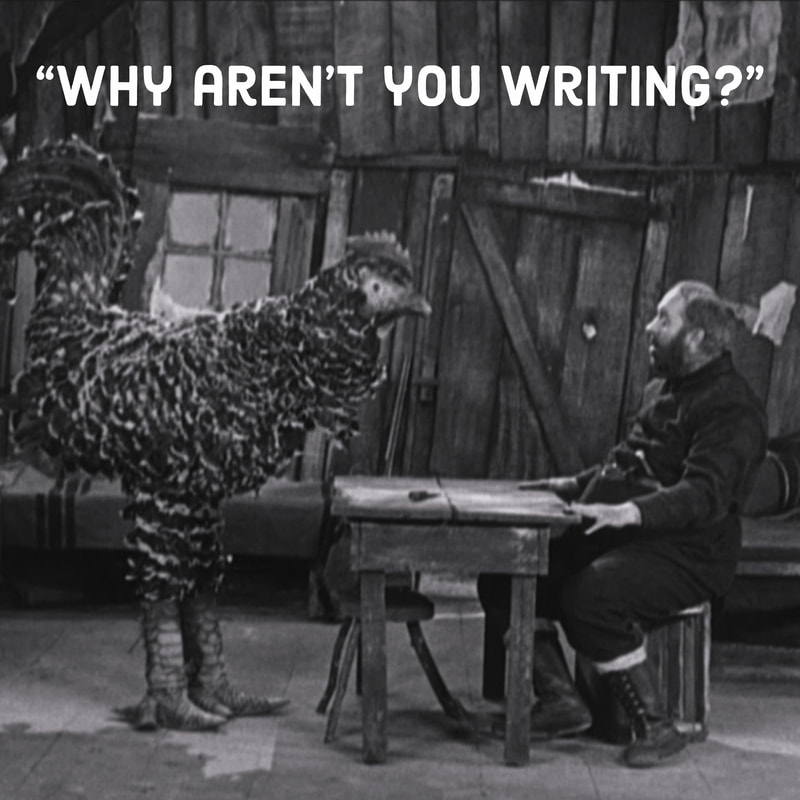
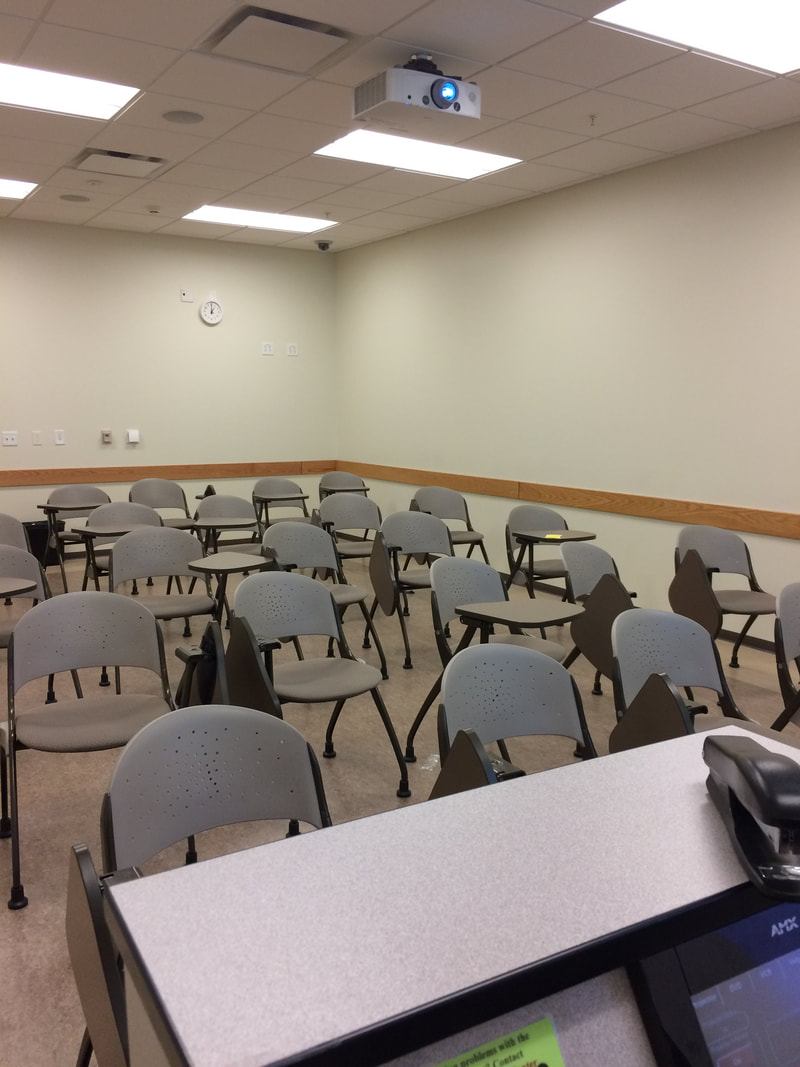
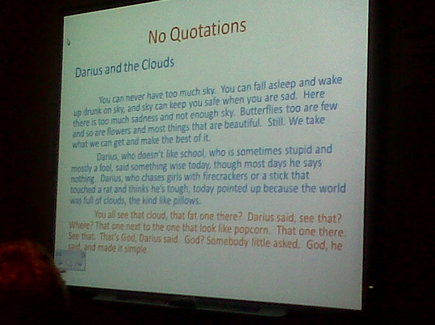
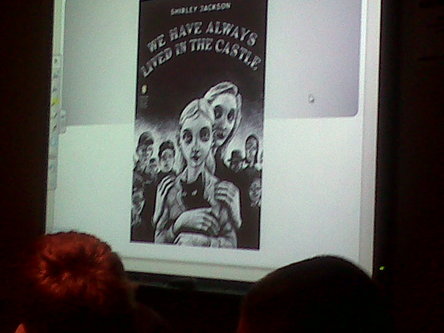
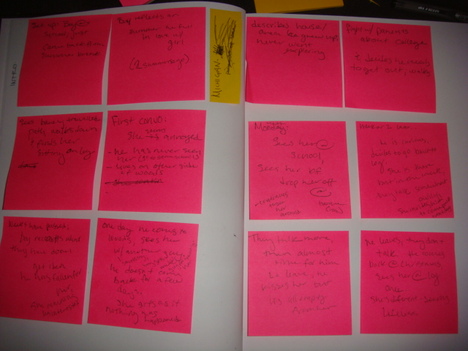
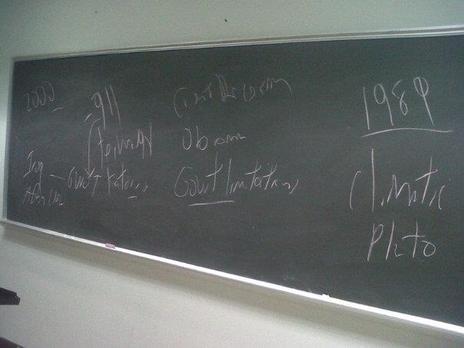
 RSS Feed
RSS Feed
